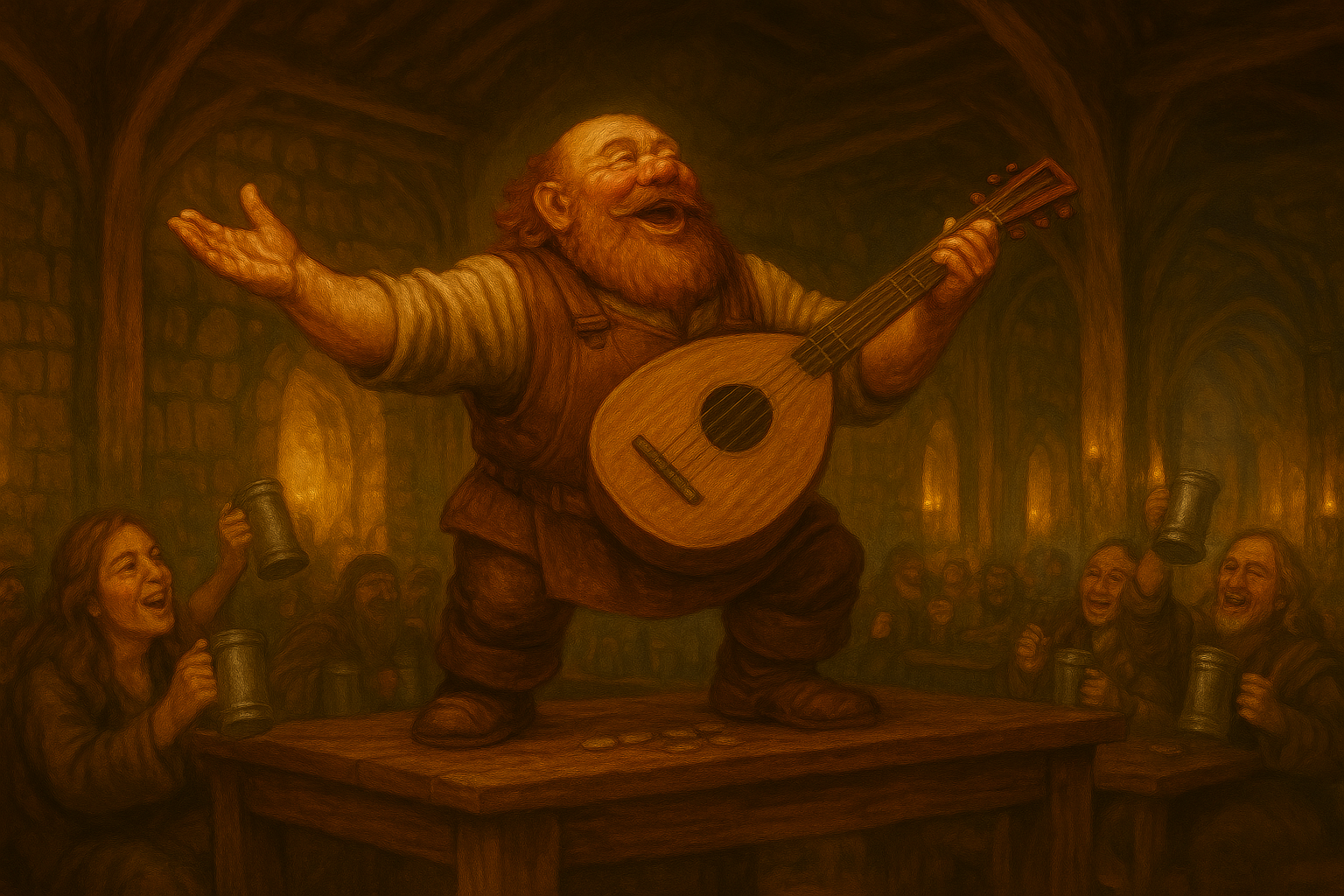When the Loudest Player Starts Running the Table
This guide is part of Mike’s GM Survival Scrolls.
Start here: When Yer Table’s Crumblin’ and Yer Torch Is Burnin’ Low
Want the rest o’ the scrolls while yer still wrestlin’ the table back? Try these:
By Tharn’s Itchy Chainmail, Sit Down and Let Someone Else Talk
Every tavern’s got one. The bard who won’t shut up. The player who answers every question not meant for them. The fighter who interrupts every NPC. The wizard who insists on bein’ the one to cast the final spell. Not because it’s right for the scene. Not because the group agreed. Just because they always do.
And before ya know it, yer not runnin’ the game anymore — they are. You’re just a quest-giver with a beard and a voice box, watchin’ as one milk-drinkin’, glory-hoggin’ pebble counter steamrolls every scene, every decision, every bloody moment of the campaign.
I’ve had tables where the quiet ones never got a word in. Not ‘cause they didn’t want to — but because the loud one never stopped talkin’. This ain’t leadership. It’s spotlight theft, and if left unchecked, it don’t just break immersion — it breaks players.
So if yer table’s startin’ to feel like a one-man show, let’s talk about how to take yer game back without flippin’ the board.
Just Because They Talk Loud Don’t Mean They’re Right
👉 If yer table’s feelin’ more like a hostage situation than a shared story, come grab tools from the GM Wisdom archive or bang on the contact page door — we’ll help ya wrestle the reins back.
Why Loud Players Take Over
It usually ain’t malicious. But it is destructive.
Here’s what might be goin’ on:
They’re excited. Genuinely. They love the game, the world, the story. But excitement ain’t an excuse for dominatin’.
They’re uncomfortable with silence. So they fill every gap — even ones meant for others.
They’re used to bein’ the leader. In real life, at work, in other games — they expect the table to follow.
They don’t notice. Truly. They think they’re just “helpin’” or “moving things along.”
But here’s the problem: when one voice dominates, others vanish. Yer table becomes an echo chamber with one tone, one plan, one flavor. That’s not a party — that’s a hostage caravan.
How to Fix It Without Breakin’ the Tankards
1. Establish a Talking Stick — Metaphorically or Literally
Set a rhythm. One action, one reaction, then rotate. Or even use a visual token. Whoever has it speaks. Then pass it. If it sounds childish, good. Grown folk need structure too.
2. Ask Questions Directly — By Name
“Thalia, what’s yer take on this?”
“Durm, where’s yer axe headin’ next?”
If ya always ask the table as a whole, the loud one’ll answer every time. Direct yer spotlight.
3. Use In-Game Consequences for Overreach
If one character keeps makin’ unilateral decisions — lettin’ prisoners go, startin’ fights, speakin’ for the group — then NPCs react accordingly. Fear, distrust, resistance. Make it clear that speakin’ for all means owning all outcomes.
4. Have the Talk — Out of Game
Pull ‘em aside. “Hey, lad — I love yer enthusiasm, but the others ain’t gettin’ space. Can ya help me spotlight the rest?”
Frame it as a request for help. Loud folk often think they are helpin’. Show ‘em how to do it right.
If this feels familiar, take a stroll through When Session Zero Didn’t Save You. Sometimes the fix ain't rules — it's reminders.
And if that same player also refuses to listen, change, or slow down? That might mean ya’ve got a deeper issue at play — and you’d best look at If You Split the Party, You Deserve What’s Comin’ while yer at it. Table shenanigans tend to travel in packs.
If Yer Voice Fills the Room, Make Damn Sure It’s Worth Hearin’
👉 Back in my day, we shared the stage or got kicked outta the tavern. Visit About Mike’s Tavern for a reminder why this whole damn blog exists — and then hit the GM Wisdom page before one more player writes the whole story themselves.
⚠️ And if one more player starts answerin’ for the bard, the ranger, the bloody DM’s NPC, I swear by Brunlin’s missing eyebrow, I’ll bind their mouth with rope and flavor text.
FAQ
Q: What if the loud player doesn’t mean harm?
A: Most don’t. But that don’t mean it’s harmless. Fix it gentle — but fix it fast.
Q: Can I ban players from speakin’ out of turn?
A: You can — but it’s better to structure turn-taking than bark rules. Let the group help enforce the flow.
Q: What if the rest of the group is fine with it?
A: Ask ‘em one by one. In private. Loud folk drown out discomfort. Make space for honesty.


